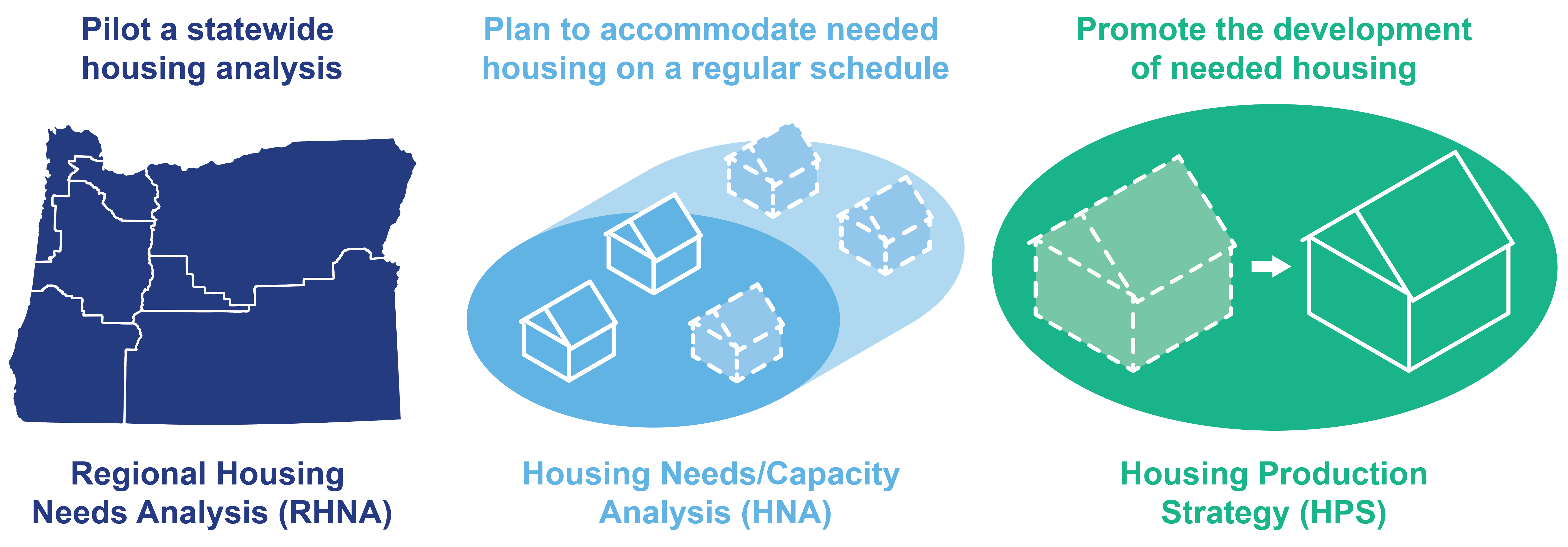In 2019, the Oregon Legislature passed House Bill 2003 which aims to help communities meet the housing needs of Oregonians. The law requires Oregon's cities over 10,000 population to study the future housing needs of their community members and to develop strategies that encourage the production of the housing they need.

Overview
In Oregon, cities have a long-standing requirement to study and plan for their community's housing needs. House Bill 2003 now adds a new rule for cities with a population over 10,000. They must study and plan for the housing needs of both current and future residents every six or eight years, depending on their location.
For cities within the Portland Metro Boundary, they need to update their Housing Capacity Analysis (HCA) every six years. Cities outside the Portland Metro Boundary must have an eight year update cycle for their HCA.
The bill also requires each city above 10,000 population to adopt a Housing Production Strategy (HPS) within one year of completing their Housing Capacity Analysis. This strategy must include specific actions the city plans to take, like changing regulations or offering financial incentives, to encourage the development of the necessary housing types identified in the analysis.
Housing Capacity Analysis
To address the housing needs a community effectively, cities in Oregon must conduct a Housing Capacity Analysis (HCA). The HCA helps the city determine if a city has enough land to meet projected housing needs for the next two decades. If there is a shortfall in housing capacity, the city must either amend its urban growth boundary (UGB), allow more housing development within the existing UGB, or combine both approaches.
Cities with a population larger than 2,500 have a broader responsibility to plan for a variety of housing types beyond single-family detached housing. They must include multi-unit housing, manufactured homes, renter occupied units, government assisted units, and other forms of housing in their planning. Collectively, this range of housing types, characteristics, and locations is known as "needed housing," and it must be affordable to community members' income levels.
Housing designated as "needed housing" receives certain protections under state law, reducing costs, delays, or other barriers to its development. You can learn more about "needed housing" on this webpage.
Housing Production Strategy
House Bill 2003 requires cities with over 10,000 people create a Housing Production Strategy (HPS) within a year of adopting their Housing Capacity Analysis (HCA). The HPS contains specific and meaningful plans, tools, actions, and policies to address housing needs identified in the HCA, along with a timeline for adopting and executing each strategy. The Department of Land Conservation and Development (DLCD) will review and approve each city's HPS to ensure it effectively meets housing needs, encourages necessary housing production, and promotes fair and equitable housing outcomes.
Cities must evaluate their HPS progress and effectiveness at a mid-term checkpoint, occurring every 3 or 4 years based on their HCA schedule. This assessment helps identify successful strategies, areas for improvement, and course corrections to ensure all housing needs are met.
In December 2025, LCDC adopted rules implementing the Oregon Housing Needs Analysis. This includes new rules pertaining to Housing Production Strategies which both refined and expanded the housing needs being addressed by the HPS action plan.
To support jurisdictions in selecting actions which best address their identified housing needs, LCDC also adopted an updated HPS Menu of Actions (OAR 660-008 Attachment B). The new list of actions is sortable by category and mechanism, as well as the types, locations, and characteristics of housing they impact.
The links to the updated menu and a “how to" guide can be found below:
To learn more about the rulemaking process including past meeting materials and summaries, visit the
Housing Rulemaking web page.
DLCD and Lisa Bates, Ph.D., and researcher Seyoung Sung, Ph.D., partnered to create an Anti-Displacement and Gentrification Toolkit. This resource helps cities as they work on their HPS by guiding them in pursuing housing development while preventing displacement.
The toolkit provides a step-by-step approach for practitioners to analyze and understand the gentrification and displacement dynamics in their communities. It enables them to identify the right housing production strategies to stabilize these communities.
Provide Your Input on Housing Production Strategy & Housing Coordination Strategy Reports
DLCD follows a transparent process before making a final decision on approving or remanding an adopted Housing Production Strategy (HPS) and Housing Coordination Strategy (HCS) report. They allow the public to provide feedback on the HPS and HCS reports during a 45-day public comment period.
Currently, DLCD is seeking public comment on the following HPS and HCS reports. Public comments may be submitted via email to
housing.dlcd@dlcd.oregon.gov.
Stay Connected
Please continue to visit this page frequently. Information will be updated as local governments continue to implement House Bill 2003.
If you would like to receive email updates on DLCD housing work, sign up to the Housing GovDelivery list.
Local planners should contact their DLCD
Regional Representative for more information.